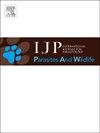First detection of Echinococcus multilocularis in golden jackals (Canis aureus) in Bosnia and Herzegovina
IF 2
3区 医学
Q3 ECOLOGY
International Journal for Parasitology-Parasites and Wildlife
Pub Date : 2025-06-11
DOI:10.1016/j.ijppaw.2025.101099
引用次数: 0
Abstract
Echinococcus multilocularis, the causative agent of alveolar echinococcosis (AE), is a parasitic zoonosis of increasing public health significance in Europe. Although previously confirmed in red foxes in Bosnia and Herzegovina, this study provides the first report of E. multilocularis in golden jackals (Canis aureus) in the country. Between December 2024 and March 2025, a total of 44 golden jackals were examined across 15 localities in Bosnia and Herzegovina, with E. multilocularis detected in 6.8 % of the samples from three sites in Western and Central Bosnia and Herzegovina. Adult Echinococcus spp. worms were first detected using the intestinal scraping technique and identified by microscopy. To confirm these findings and differentiate between Echinococcus species, DNA extracted from adult worms was then subjected to species-specific PCR targeting a fragment of the mitochondrial 12S ribosomal RNA gene. PCR-positive samples for E. multilocularis were further validated by next-generation sequencing (NGS) of a 203 bp amplicon of the 12S rRNA gene. These findings indicate an expanding distribution of E. multilocularis in Bosnia and Herzegovina, highlighting the role of golden jackals as definitive hosts for the parasite. Given the growing jackal population in the country and the increasing public health concerns, enhanced surveillance and further research are warranted, particularly regarding human cases of E. multilocularis infection, to better understand the associated epidemiological risks.

波黑金豺首次检出多房棘球蚴
多房棘球蚴是肺泡棘球蚴病(AE)的病原体,是一种寄生虫性人畜共患病,在欧洲越来越具有公共卫生意义。虽然先前在波斯尼亚和黑塞哥维那的红狐中得到证实,但本研究提供了该国金豺(金色豺)中多房棘球绦虫的首次报告。在2024年12月至2025年3月期间,在波斯尼亚和黑塞哥维那的15个地点共检查了44只金豺,在波斯尼亚和黑塞哥维那西部和中部的三个地点的6.8%的样本中检测到多房胡狼。棘球绦虫成虫首次用肠道刮痧法检测到,并用显微镜鉴定。为了证实这些发现并区分棘球绦虫的种类,从成虫中提取的DNA随后进行了针对线粒体12S核糖体RNA基因片段的物种特异性PCR。pcr阳性样本通过12S rRNA基因203 bp扩增子的下一代测序(NGS)进一步验证。这些发现表明多房棘球绦虫在波斯尼亚和黑塞哥维那的分布不断扩大,突出了金豺作为寄生虫最终宿主的作用。鉴于该国的胡狼数量不断增加,公共卫生问题日益严重,有必要加强监测和进一步研究,特别是关于多房肠杆菌感染人间病例,以便更好地了解相关的流行病学风险。
本文章由计算机程序翻译,如有差异,请以英文原文为准。
求助全文
约1分钟内获得全文
求助全文
来源期刊

International Journal for Parasitology-Parasites and Wildlife
Medicine-Infectious Diseases
CiteScore
3.80
自引率
5.60%
发文量
113
审稿时长
45 days
期刊介绍:
The International Journal for Parasitology: Parasites and Wildlife (IJP-PAW) publishes the results of original research on parasites of all wildlife, invertebrate and vertebrate. This includes free-ranging, wild populations, as well as captive wildlife, semi-domesticated species (e.g. reindeer) and farmed populations of recently domesticated or wild-captured species (e.g. cultured fishes). Articles on all aspects of wildlife parasitology are welcomed including taxonomy, biodiversity and distribution, ecology and epidemiology, population biology and host-parasite relationships. The impact of parasites on the health and conservation of wildlife is seen as an important area covered by the journal especially the potential role of environmental factors, for example climate. Also important to the journal is ''one health'' and the nature of interactions between wildlife, people and domestic animals, including disease emergence and zoonoses.
 求助内容:
求助内容: 应助结果提醒方式:
应助结果提醒方式:


